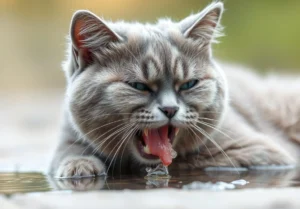Cats can be notoriously picky drinkers, often not getting enough water in their daily routine. But why do cats get dehydrated?
Cats can get dehydrated due to various reasons, including not drinking enough water or underlying health issues. Understanding the causes and signs of dehydration in cats is crucial for their well-being.
Importance of Hydration for Cats
Proper hydration is crucial for your feline friend’s overall health and well-being. Just like humans, cats depend on water to keep their bodies functioning optimally. Hydration plays a vital role in maintaining healthy organ function, aiding digestion, regulating body temperature, and promoting proper metabolism.
Without adequate hydration, cats are at risk of various health issues, including dehydration. Ensuring your cat has access to fresh water at all times is essential. Some cats can be picky about their water source, so experimenting with a water fountain or providing wet food can help encourage hydration.
Signs of Dehydration in Cats
Recognizing the signs of dehydration in cats is crucial for early intervention. Common symptoms include lethargy, sunken eyes, dry mouth, loss of appetite, and panting. If you notice any of these signs in your cat, seek veterinary care promptly to prevent further complications.
Additionally, monitoring your cat’s water intake and encouraging them to drink more can help prevent dehydration. Providing multiple water sources around the house and regularly cleaning water bowls can make drinking more enticing for your feline companion. Remember, staying hydrated is essential for your cat’s overall health and well-being.
Common Causes of Dehydration in Cats
Dehydration in cats can occur due to various reasons, including medical conditions like kidney disease, diabetes, or hyperthyroidism. Environmental factors such as warm weather, low humidity, or lack of easily accessible water sources can also contribute to dehydration in felines. Stress, old age, or inadequate water intake can further exacerbate the risk of dehydration in cats.
Tips for Encouraging Hydration
- Fresh Water: Ensure your cat has access to fresh, clean water at all times. Cats prefer flowing water, so consider investing in a cat fountain to entice them to drink more.
- Wet Food: Incorporating wet food into your cat’s diet can increase their overall water intake. This can be particularly useful for cats that are reluctant drinkers.
- Multiple Water Sources: Place water bowls in different areas of your home to make it convenient for your cat to hydrate throughout the day.
- Flavored Water: Adding a splash of tuna juice or low-sodium chicken broth to your cat’s water can make it more appealing and encourage them to drink.
- Regular Monitoring: Keep an eye on your cat’s water intake and monitor for signs of dehydration, such as dry gums, sunken eyes, or lethargy.
For more information on feline hydration and the importance of water intake, check out this resource from the American Association of Feline Practitioners: Feline Hydration Guidelines.
Hydration Alternatives for Cats
When it comes to ensuring your feline friend stays hydrated, offering a variety of hydration alternatives can be key. One popular option is incorporating wet food into your cat’s diet. Wet food has a higher water content compared to dry kibble, helping keep your cat hydrated throughout the day. Additionally, investing in a water fountain can entice your cat to drink more water by mimicking the flow of a fresh stream.
For cats who are picky about drinking water, experimenting with different types of bowls or even adding a splash of tuna juice to their water can make it more appealing. Remember, consistency is key when it comes to hydration, so try to offer these alternatives regularly to encourage your cat to drink more water and avoid dehydration.
Preventing Dehydration in Senior Cats
As our furry companions age, their hydration needs may change. Senior cats may be more prone to dehydration due to factors such as decreased kidney function or fewer trips to the water bowl. To prevent dehydration in older cats, consider offering smaller, more frequent meals throughout the day. This not only provides essential nutrients but also encourages your senior cat to sip on water more regularly.
In addition to monitoring your senior cat’s hydration levels, ensure they have easy access to water at all times. Placing water bowls in various locations around the house can make it easier for your senior cat to stay hydrated, especially if they have mobility issues. For an extra hydration boost, consider adding a few drops of low-sodium broth to your cat’s water to entice them to drink more. Remember, keeping a close eye on your senior cat’s water intake and making adjustments as needed can go a long way in preventing dehydration.
Importance of Regular Vet Check-ups
Regular vet check-ups are as essential for your feline friend as tuna treats are for their happiness. These visits can be a lifesaver when it comes to detecting dehydration early on. Why wait for an issue to escalate when a simple vet visit can catch it in its tracks? Remember, prevention is always better than a feline emergency.
Fun Facts About Cat Hydration
Let’s dive into some fascinating tidbits about hydration in our whiskered companions. Did you know that cats have a low thirst drive compared to other animals, making dehydration a common issue among our meowing buddies? Moreover, cats have a keen ability to conserve water in their bodies, thanks to their desert-dwelling ancestors. Keep those water bowls fresh and full to keep your cat hydrated and healthy!
And here’s a bonus tip: Cats prefer flowing water over stagnant sources, so consider investing in a water fountain to entice your feline friend to drink more.
Alex, a passionate animal lover, has experience in training and understanding animal behavior. As a proud pet parent to two dogs and three cats, he founded AnimalReport.net to share insights from animal experts and expand his knowledge of the animal kingdom.




